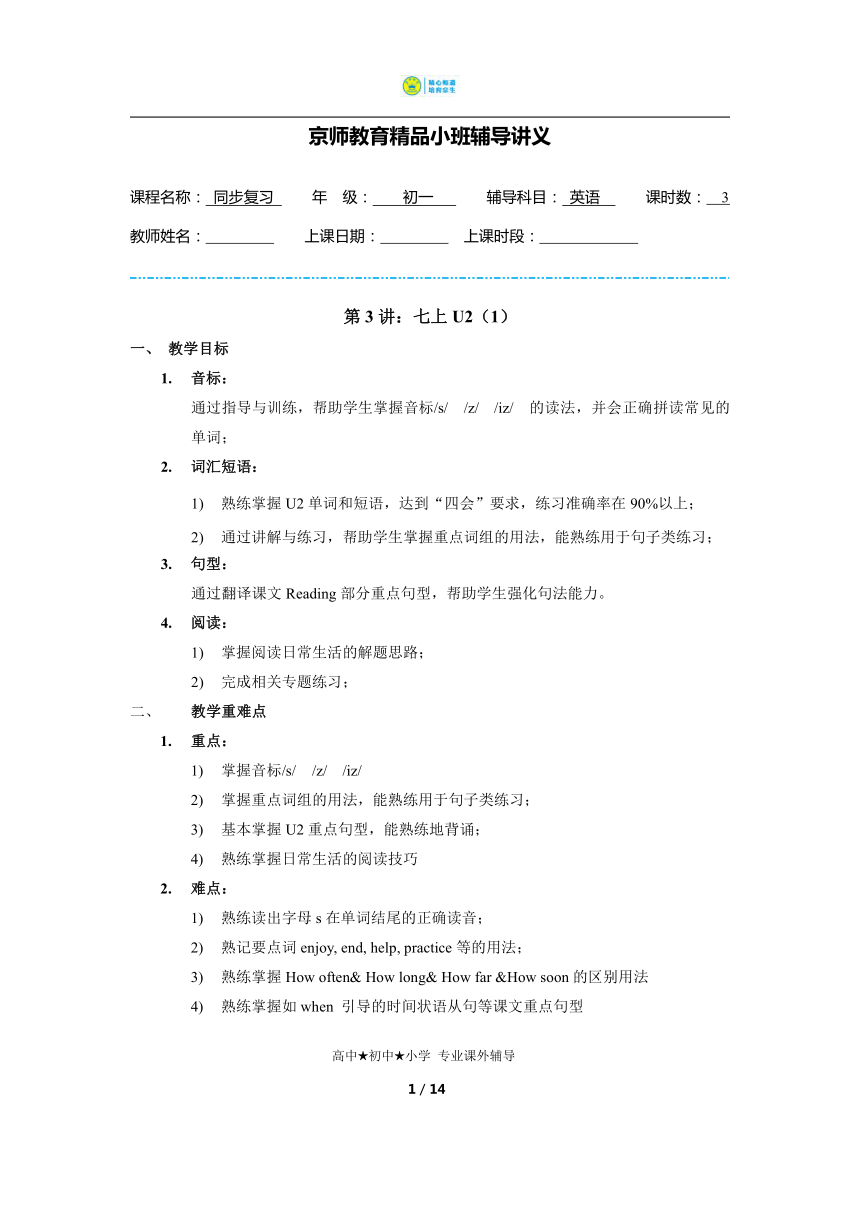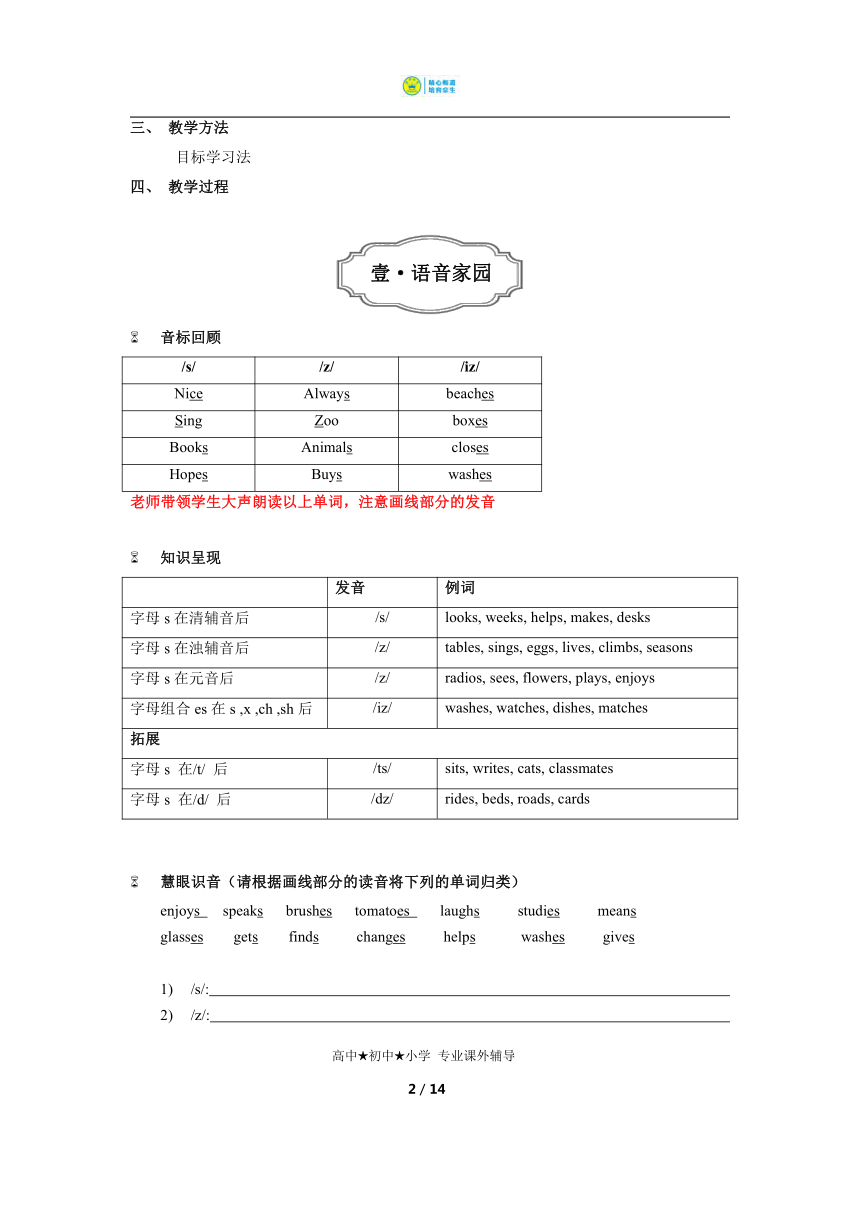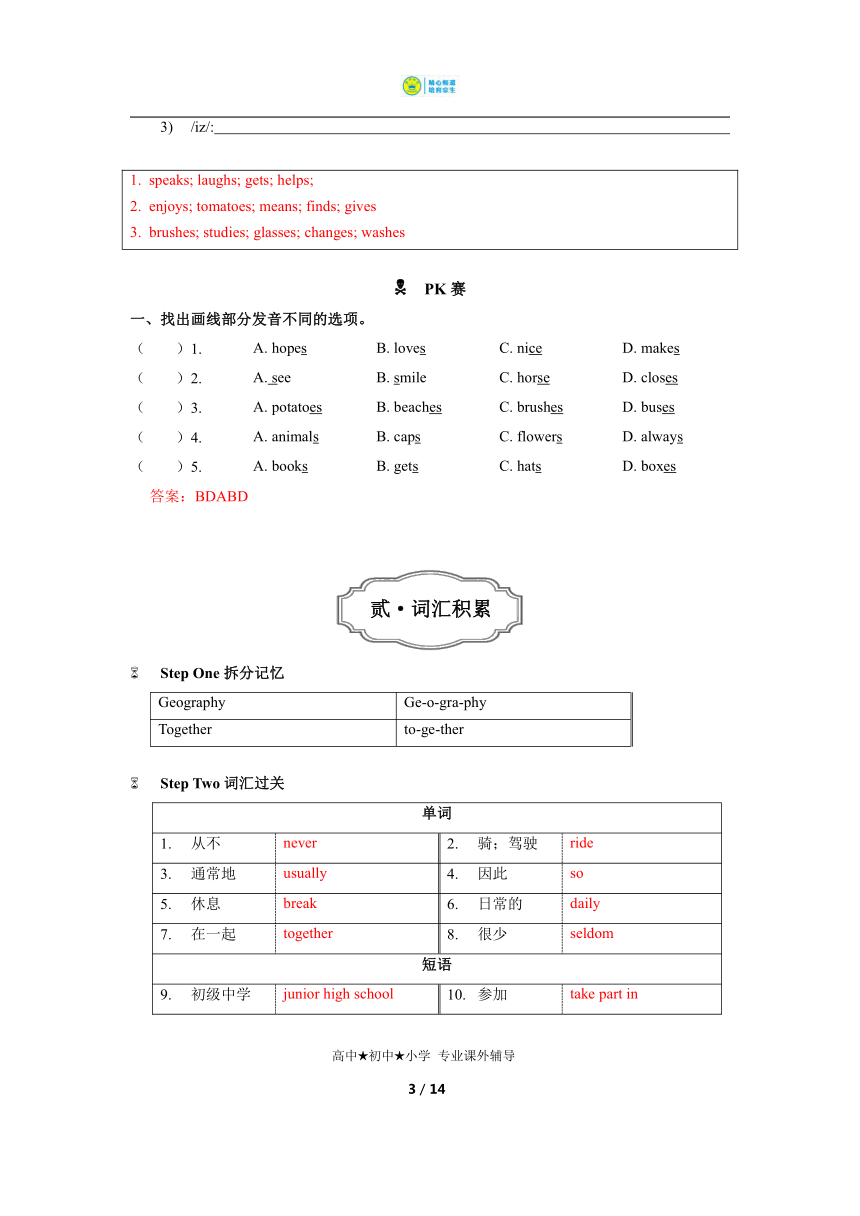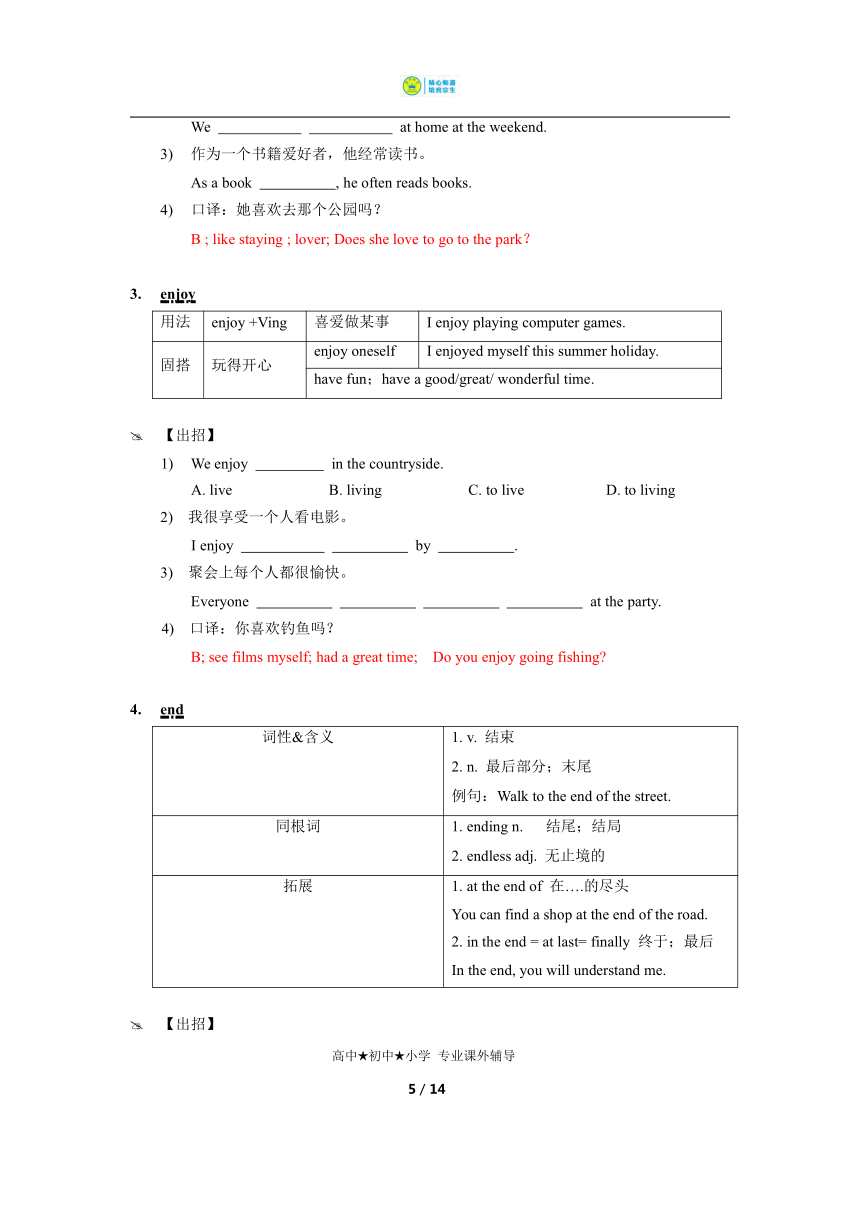【培优讲义】第3讲 英语牛津深圳版 七年级上册 Unit 2 Daily life(1)
文档属性
| 名称 | 【培优讲义】第3讲 英语牛津深圳版 七年级上册 Unit 2 Daily life(1) |

|
|
| 格式 | docx | ||
| 文件大小 | 222.2KB | ||
| 资源类型 | 试卷 | ||
| 版本资源 | 牛津深圳版 | ||
| 科目 | 英语 | ||
| 更新时间 | 2021-12-11 09:58:22 | ||
图片预览





文档简介
京师教育精品小班辅导讲义
课程名称: 同步复习 年 级: 初一 辅导科目: 英语 课时数: 3
教师姓名: 上课日期: 上课时段:
第3讲:七上U2(1)
教学目标
音标:
通过指导与训练,帮助学生掌握音标/s/ /z/ /iz/ 的读法,并会正确拼读常见的单词;
词汇短语:
熟练掌握U2单词和短语,达到“四会”要求,练习准确率在90%以上;
通过讲解与练习,帮助学生掌握重点词组的用法,能熟练用于句子类练习;
句型:
通过翻译课文Reading部分重点句型,帮助学生强化句法能力。
阅读:
掌握阅读日常生活的解题思路;
完成相关专题练习;
教学重难点
重点:
掌握音标/s/ /z/ /iz/
掌握重点词组的用法,能熟练用于句子类练习;
基本掌握U2重点句型,能熟练地背诵;
熟练掌握日常生活的阅读技巧
难点:
熟练读出字母s在单词结尾的正确读音;
熟记要点词enjoy, end, help, practice等的用法;
熟练掌握How often& How long& How far &How soon的区别用法
熟练掌握如when 引导的时间状语从句等课文重点句型
三、 教学方法
目标学习法
四、 教学过程
音标回顾
/s/ /z/ /iz/
Nice Always beaches
Sing Zoo boxes
Books Animals closes
Hopes Buys washes
老师带领学生大声朗读以上单词,注意画线部分的发音
知识呈现
发音 例词
字母s在清辅音后 /s/ looks, weeks, helps, makes, desks
字母s在浊辅音后 /z/ tables, sings, eggs, lives, climbs, seasons
字母s在元音后 /z/ radios, sees, flowers, plays, enjoys
字母组合es在s ,x ,ch ,sh后 /iz/ washes, watches, dishes, matches
拓展
字母s 在/t/ 后 /ts/ sits, writes, cats, classmates
字母s 在/d/ 后 /dz/ rides, beds, roads, cards
慧眼识音(请根据画线部分的读音将下列的单词归类)
enjoys speaks brushes tomatoes laughs studies means
glasses gets finds changes helps washes gives
/s/:
/z/:
/iz/:
speaks; laughs; gets; helps; enjoys; tomatoes; means; finds; gives brushes; studies; glasses; changes; washes
PK赛
一、找出画线部分发音不同的选项。
( )1. A. hopes B. loves C. nice D. makes
( )2. A. see B. smile C. horse D. closes
( )3. A. potatoes B. beaches C. brushes D. buses
( )4. A. animals B. caps C. flowers D. always
( )5. A. books B. gets C. hats D. boxes
答案:BDABD
Step One拆分记忆
Geography Ge-o-gra-phy
Together to-ge-ther
Step Two词汇过关
单词
从不 never 骑;驾驶 ride
通常地 usually 因此 so
休息 break 日常的 daily
在一起 together 很少 seldom
短语
初级中学 junior high school 参加 take part in
过得愉快 have a good time 起床 get up
去睡觉 go to bed 步行 on foot
Step Three 要点精讲
1. daily
含义 例句
daily adj. 每日的;日常的(everyday) adv. 每日(every day) This is a daily newspaper. I receive at least 3 emails daily.
Day n. 天,日 There are seven days in a week.
【出招】
I go to school on foot .
A. everyday B. all day
C. daily
The doctor makes a visit to his parents.
这位医生每天去看他的病人。
3)口译:他需要天天运动。
A; daily; He needs daily exercise.
love
同根词 1. lovely adj. 可爱的 2. lover n. 爱好者,爱人 3. loving adj. 充满爱的
拓展 1. love/like to do… 喜欢做某事(强调一次或偶然) 2. love/like doing…喜欢做某事(强调习惯性或经常性或爱好) 3. fall in love with… 爱上….
【出招】
She loves the guitar very much.
A. play B. playing
C. plays
在周末,我们喜欢待在家里。
We at home at the weekend.
作为一个书籍爱好者,他经常读书。
As a book , he often reads books.
口译:她喜欢去那个公园吗?
B ; like staying ; lover; Does she love to go to the park?
enjoy
用法 enjoy +Ving 喜爱做某事 I enjoy playing computer games.
固搭 玩得开心 enjoy oneself I enjoyed myself this summer holiday.
have fun;have a good/great/ wonderful time.
【出招】
We enjoy in the countryside.
A. live B. living C. to live D. to living
2) 我很享受一个人看电影。
I enjoy by .
3) 聚会上每个人都很愉快。
Everyone at the party.
4) 口译:你喜欢钓鱼吗?
B; see films myself; had a great time; Do you enjoy going fishing
end
词性&含义 1. v. 结束 2. n. 最后部分;末尾 例句:Walk to the end of the street.
同根词 1. ending n. 结尾;结局 2. endless adj. 无止境的
拓展 1. at the end of 在….的尽头 You can find a shop at the end of the road. 2. in the end = at last= finally 终于;最后 In the end, you will understand me.
【出招】
会议下午五点结束。
The meeting will 5 p.m.
你知道这个故事的结局吗?
Do you know the of the story
3)选词组填空: at the end of, in the end
We had a meeting last month.
He found his key .
end at; ending; at the end of; in the end
help
同根词 1. helpful adj. 有用的 例句:The following information may be helpful to readers. 2. helpless adj. 无助的 例句:The worst part is being helpless to change anything.
拓展 1. help sb. with sth. 在某一方面帮助某人 2. help sb. to do sth.= help sb. do sth. 帮助某人做某事 3. can’t help doing sth. 忍不住做某事 4. help oneself to sth. 随便用或吃东西
【出招】
1)Would you like to help me my homework
A. with do B. do C. to doing
2) Ann经常放学后帮我(学)数学。
Ann often after class.
3) 她发现这本书非常有用。
She found the book very .
4) 口译:他忍不住大笑。
B; helps me with maths; helpful; He can’t help laughing.
practice
词性转换 v. practise 练习 We need to practise singing every day.
n. practice 练习 We often do some practice after class.
【出招】
1) Learning a language needs a lot of . (practise)
2) 她每天练习唱歌和跳舞至少四个小时。
She and for at least four hours every day.
3) 口译: 熟能生巧
practice; practises singing dancing; Practice makes perfect.
词汇辨析
四个“how”
例句 辨析
How often How often do you feed the dog 多经常….(频率)
How long How long will you stay here How long is the ruler 多久….(时间); 多长… (长度)
How far How far is your home from school 多远…(距离)
How soon How soon will you get here 多快…(时间)
---你多久看一次电视? ----每周一两次。
A: you see a film
B: Once or twice a week.
他多久回来?
he be back
- will you stay here
-More than two moths. (2016山东威海)
A. When B. How soon C. How long
How often; How soon will; C
PK赛
用所给词的正确形式填空
He practices (play) the piano every day.
The doorbell (ring).
We all enjoyed (we) yesterday.
4. She always helps her mother _______(do) housework.
playing; rang; ourselves; do
首字母填空
Could you tell me your d life?
When the bell r , I ran to the playground.
She does singing and dancing p for at least four hours a day.
Classes begin at 8:00 a.m. and e_______ at 3:30 p.m.
They usually have a ten-minute b________ after class.
daily; rings; practice; end; break
完成句子
午餐时间是从上午11:50到下午12:30
Lunchtime is 11:50 a.m. 12:30 p.m.
我想参加足球比赛。
I’d like to the football match.
请帮我学法语。
Please me my French.
你在北京玩得开心吗?
you in Beijing
from to; take part in; help with/ learn; Did have fun
Step One 朗读课文
先让学生有感情地朗读Reading部分课文,随机提问一些课文难句要学生口头翻译;
Step Two 听音练习
播放课文Reading部分录音,要学生逐句跟读,遇到跟读不顺的地方,老师记下来,读完后稍做点拨讲解;
Step Three 句型翻译
以下皆是Reading部分原句,翻译完后让学生对照课文自行修改。
我是一个初级中学的学生,我喜欢上学(love doing)
I am a junior high school student, I love going to school.
_________________________________________________________________
我的学校靠近我的家,所以我一直步行去学校。(on foot)
My school is close to my home, so I always go to school on foot.
__________________________________________________________________
上午八点开始上课,而我很少迟到。(seldom)
Classes start at 8 a.m., and I am seldom late.
__________________________________________________________________
铃声一响,我就和我最好的朋友汤姆和杰克一起飞奔向操场。(ring)
When the bell rings, I run to the playground with my best friends Tom and Jack.
__________________________________________________________________
然后我和汤姆,杰克参加学校的乐队训练。(take part in)
Then Tom, Jack and I take part in the school band practice.
__________________________________________________________________
在学校我一直过得很愉快。(have a good time)
I always have a good time at school.
__________________________________________________________________
时间是多么的短暂啊。(how)
How short it is!
__________________________________________________________________
【例题】
技巧点拨: 把握关键词
America students usually get up at 7 in the morning from Monday to Friday. After breakfast they go to school on foot or by yellow school bus. Some students ride bikes. They get to school at about half past eight. In middle school students have classes about six hours. Their classes are English Writing, Maths , History, Science, P.E, Music and Art. At noon, students have lunch at school. They don’t have time for a short sleep. They go back to have classes after lunch until three o’clock. Then they go home. Students usually play or watch TV before dinner. They have dinner at six in the evening. After dinner they do their homework. Sometimes they play or talk with their parents. On Saturdays they often go shopping or visit their grandparents. And on Sundays they go with their parents to church(教堂) in the morning and have a big meal (饭) at one o’clock in the afternoon.
第一步:泛读环节---限时阅读(5mins)
(这部分要求学生根据who, what两方面,用自己的话简单概述文章大意)
第二步:精读环节---回答问题 DDCAB
一.回答问题
1. What time do American students get to school in the morning
A. At about 7. B. At about 7:30. C. At about 8. D. At about 8:30
2. What classes do the middle school students have
A. English Writing, Maths and History.
B. Science and P.E.
C. Music and Art.
D. All the above.
3. Where do American students have lunch on weekdays .
A. In a restaurant. B. At home. C. At school. D. In KFC.
4. What do American students often do on Sunday
A. Go to church. B. Visit friends. C. Go to a Park D. Go shopping
5. What is the passage about
A. American families. B. American students.
C. American schools. D. American parents.
二.长难句分析
1. After breakfast they go to school on foot or by yellow school bus.
1)翻译: on foot or
2) by + 交通工具:表乘坐….交通
他经常乘公交去上学。
3)句子翻译:
2. They go back to have classes after lunch until three o’clock.
1)生词注释: until 直到….为止
2)咱们等雨停了吧。
Let’s the rain stops. wait until
3)句子翻译:
他们午饭后再去上课,直到三点(放学)。
【实战演练】
The day is like any other day in his life. Henry walks past the shop at the street corner. He stops to look at the front row(排)of shoes. He feels happy to see that pair of shoes he wants is still there. But he feels sorry for himself. He really wants to have them for his birthday.
He sadly walks away and thinks how to tell his mother about it. He knows she will give him anything he likes if she can. He also knows she has little money. He decides (决定)not to go home so quickly, because he looks worried and his mother will see it. So he goes to the park and sits on the grass. Then he sees a boy in a wheel chair(轮椅). He finds out the boy moves the wheel chair with his hands. Henry looks at him carefully and is surprised to see the boy has no feet.
He looks at his own feet. “It’s much better to be without shoes than without feet,” he thinks, there is no reason(理由) for me to feel so sorry and sad.
1. Henry passes the shop .
A. by bus B. on foot
C. by bike D. by car
2. Why does Henry stop in front of the shop
A. Because he has the same shoes like the ones in the shop. . B. Because he likes shoes. C. Because he wants to buy the shoes. D. Because the shoes are very expensive.
3. The pair of shoes Henry likes is .
A. too small B. quite cheap
C. not popular with many people D. still in the shop
4. Henry goes to the park because he .
A. knows the park is beautiful B. wants to see the boy in a wheel chair
C. doesn’t want to make his mother worried D. feels excited
5.From the story we can know Henry .
A. loves his mother very much B. doesn’t want to stay at home
C. doesn’t want to go to school D. likes buying shoes very much
BCDCA
语音
/s/ /z/ 3. /iz/
词汇短语
1. 日常的天分别怎么说?daily, day 2. 喜欢做某事的两种说法?love/like doing
3. 玩得开心的两种说法? 4. 关于end 的两个短语?
5. 帮助某人做某事两种说法? 6.“练习”两种词性?
7. how(often/ long/ soon/far)的区别?
语音选择:找出下列每组中划线部分发音不同的单词。
( )1. A. afraid B. main C. affair D. daily
( )2. A. hide B. climb C. ride D. minute
( )3. A. purple B. middle C. lecture D. table
( )4. A. secret B. engineer C. twelve D. pencil
( )5. A. baby B. black C. grade D. same
CDCAB
二、 单项选择
–Do you enjoy ________ in Shenzhen
– Yes, they do.
A. work B. works C. working D. to work
–__________ do you watch TV
– Twice a week.
A. How long B. How often C. How soon D. How old
3. It’s rainy heavily, _______ we decided to stay at home and watch TV. (2014·天津)
A. but B. or C. because D. so
4. My sister _________ goes to bed early because she needs a lots of sleep everyday.
A. always B. sometimes C. hardly D. never
CBDA
三、完成句子。
我们在上午9:50休息。
We have our morning __________ __________ 9:50 a.m.
我们经常在公园玩的很开心。
We often in the park.
有时我爸爸下班后帮助妈妈做晚饭。
My dad sometimes my mum after work.
然后我跟汤姆、杰克参加学校乐队的练习。
Then Tom, Jack and I __________ __________ __________ the school band practice.
5. 为了保持健康,我妈妈每天步行去上班。
In order to keep fit, my mum goes to work _________ _________ every day.
1. break at 2.have a great time 3.helps with/cook dinner 4.take part in 5.on foot
高中★初中★小学 专业课外辅导
13 / 13
课程名称: 同步复习 年 级: 初一 辅导科目: 英语 课时数: 3
教师姓名: 上课日期: 上课时段:
第3讲:七上U2(1)
教学目标
音标:
通过指导与训练,帮助学生掌握音标/s/ /z/ /iz/ 的读法,并会正确拼读常见的单词;
词汇短语:
熟练掌握U2单词和短语,达到“四会”要求,练习准确率在90%以上;
通过讲解与练习,帮助学生掌握重点词组的用法,能熟练用于句子类练习;
句型:
通过翻译课文Reading部分重点句型,帮助学生强化句法能力。
阅读:
掌握阅读日常生活的解题思路;
完成相关专题练习;
教学重难点
重点:
掌握音标/s/ /z/ /iz/
掌握重点词组的用法,能熟练用于句子类练习;
基本掌握U2重点句型,能熟练地背诵;
熟练掌握日常生活的阅读技巧
难点:
熟练读出字母s在单词结尾的正确读音;
熟记要点词enjoy, end, help, practice等的用法;
熟练掌握How often& How long& How far &How soon的区别用法
熟练掌握如when 引导的时间状语从句等课文重点句型
三、 教学方法
目标学习法
四、 教学过程
音标回顾
/s/ /z/ /iz/
Nice Always beaches
Sing Zoo boxes
Books Animals closes
Hopes Buys washes
老师带领学生大声朗读以上单词,注意画线部分的发音
知识呈现
发音 例词
字母s在清辅音后 /s/ looks, weeks, helps, makes, desks
字母s在浊辅音后 /z/ tables, sings, eggs, lives, climbs, seasons
字母s在元音后 /z/ radios, sees, flowers, plays, enjoys
字母组合es在s ,x ,ch ,sh后 /iz/ washes, watches, dishes, matches
拓展
字母s 在/t/ 后 /ts/ sits, writes, cats, classmates
字母s 在/d/ 后 /dz/ rides, beds, roads, cards
慧眼识音(请根据画线部分的读音将下列的单词归类)
enjoys speaks brushes tomatoes laughs studies means
glasses gets finds changes helps washes gives
/s/:
/z/:
/iz/:
speaks; laughs; gets; helps; enjoys; tomatoes; means; finds; gives brushes; studies; glasses; changes; washes
PK赛
一、找出画线部分发音不同的选项。
( )1. A. hopes B. loves C. nice D. makes
( )2. A. see B. smile C. horse D. closes
( )3. A. potatoes B. beaches C. brushes D. buses
( )4. A. animals B. caps C. flowers D. always
( )5. A. books B. gets C. hats D. boxes
答案:BDABD
Step One拆分记忆
Geography Ge-o-gra-phy
Together to-ge-ther
Step Two词汇过关
单词
从不 never 骑;驾驶 ride
通常地 usually 因此 so
休息 break 日常的 daily
在一起 together 很少 seldom
短语
初级中学 junior high school 参加 take part in
过得愉快 have a good time 起床 get up
去睡觉 go to bed 步行 on foot
Step Three 要点精讲
1. daily
含义 例句
daily adj. 每日的;日常的(everyday) adv. 每日(every day) This is a daily newspaper. I receive at least 3 emails daily.
Day n. 天,日 There are seven days in a week.
【出招】
I go to school on foot .
A. everyday B. all day
C. daily
The doctor makes a visit to his parents.
这位医生每天去看他的病人。
3)口译:他需要天天运动。
A; daily; He needs daily exercise.
love
同根词 1. lovely adj. 可爱的 2. lover n. 爱好者,爱人 3. loving adj. 充满爱的
拓展 1. love/like to do… 喜欢做某事(强调一次或偶然) 2. love/like doing…喜欢做某事(强调习惯性或经常性或爱好) 3. fall in love with… 爱上….
【出招】
She loves the guitar very much.
A. play B. playing
C. plays
在周末,我们喜欢待在家里。
We at home at the weekend.
作为一个书籍爱好者,他经常读书。
As a book , he often reads books.
口译:她喜欢去那个公园吗?
B ; like staying ; lover; Does she love to go to the park?
enjoy
用法 enjoy +Ving 喜爱做某事 I enjoy playing computer games.
固搭 玩得开心 enjoy oneself I enjoyed myself this summer holiday.
have fun;have a good/great/ wonderful time.
【出招】
We enjoy in the countryside.
A. live B. living C. to live D. to living
2) 我很享受一个人看电影。
I enjoy by .
3) 聚会上每个人都很愉快。
Everyone at the party.
4) 口译:你喜欢钓鱼吗?
B; see films myself; had a great time; Do you enjoy going fishing
end
词性&含义 1. v. 结束 2. n. 最后部分;末尾 例句:Walk to the end of the street.
同根词 1. ending n. 结尾;结局 2. endless adj. 无止境的
拓展 1. at the end of 在….的尽头 You can find a shop at the end of the road. 2. in the end = at last= finally 终于;最后 In the end, you will understand me.
【出招】
会议下午五点结束。
The meeting will 5 p.m.
你知道这个故事的结局吗?
Do you know the of the story
3)选词组填空: at the end of, in the end
We had a meeting last month.
He found his key .
end at; ending; at the end of; in the end
help
同根词 1. helpful adj. 有用的 例句:The following information may be helpful to readers. 2. helpless adj. 无助的 例句:The worst part is being helpless to change anything.
拓展 1. help sb. with sth. 在某一方面帮助某人 2. help sb. to do sth.= help sb. do sth. 帮助某人做某事 3. can’t help doing sth. 忍不住做某事 4. help oneself to sth. 随便用或吃东西
【出招】
1)Would you like to help me my homework
A. with do B. do C. to doing
2) Ann经常放学后帮我(学)数学。
Ann often after class.
3) 她发现这本书非常有用。
She found the book very .
4) 口译:他忍不住大笑。
B; helps me with maths; helpful; He can’t help laughing.
practice
词性转换 v. practise 练习 We need to practise singing every day.
n. practice 练习 We often do some practice after class.
【出招】
1) Learning a language needs a lot of . (practise)
2) 她每天练习唱歌和跳舞至少四个小时。
She and for at least four hours every day.
3) 口译: 熟能生巧
practice; practises singing dancing; Practice makes perfect.
词汇辨析
四个“how”
例句 辨析
How often How often do you feed the dog 多经常….(频率)
How long How long will you stay here How long is the ruler 多久….(时间); 多长… (长度)
How far How far is your home from school 多远…(距离)
How soon How soon will you get here 多快…(时间)
---你多久看一次电视? ----每周一两次。
A: you see a film
B: Once or twice a week.
他多久回来?
he be back
- will you stay here
-More than two moths. (2016山东威海)
A. When B. How soon C. How long
How often; How soon will; C
PK赛
用所给词的正确形式填空
He practices (play) the piano every day.
The doorbell (ring).
We all enjoyed (we) yesterday.
4. She always helps her mother _______(do) housework.
playing; rang; ourselves; do
首字母填空
Could you tell me your d life?
When the bell r , I ran to the playground.
She does singing and dancing p for at least four hours a day.
Classes begin at 8:00 a.m. and e_______ at 3:30 p.m.
They usually have a ten-minute b________ after class.
daily; rings; practice; end; break
完成句子
午餐时间是从上午11:50到下午12:30
Lunchtime is 11:50 a.m. 12:30 p.m.
我想参加足球比赛。
I’d like to the football match.
请帮我学法语。
Please me my French.
你在北京玩得开心吗?
you in Beijing
from to; take part in; help with/ learn; Did have fun
Step One 朗读课文
先让学生有感情地朗读Reading部分课文,随机提问一些课文难句要学生口头翻译;
Step Two 听音练习
播放课文Reading部分录音,要学生逐句跟读,遇到跟读不顺的地方,老师记下来,读完后稍做点拨讲解;
Step Three 句型翻译
以下皆是Reading部分原句,翻译完后让学生对照课文自行修改。
我是一个初级中学的学生,我喜欢上学(love doing)
I am a junior high school student, I love going to school.
_________________________________________________________________
我的学校靠近我的家,所以我一直步行去学校。(on foot)
My school is close to my home, so I always go to school on foot.
__________________________________________________________________
上午八点开始上课,而我很少迟到。(seldom)
Classes start at 8 a.m., and I am seldom late.
__________________________________________________________________
铃声一响,我就和我最好的朋友汤姆和杰克一起飞奔向操场。(ring)
When the bell rings, I run to the playground with my best friends Tom and Jack.
__________________________________________________________________
然后我和汤姆,杰克参加学校的乐队训练。(take part in)
Then Tom, Jack and I take part in the school band practice.
__________________________________________________________________
在学校我一直过得很愉快。(have a good time)
I always have a good time at school.
__________________________________________________________________
时间是多么的短暂啊。(how)
How short it is!
__________________________________________________________________
【例题】
技巧点拨: 把握关键词
America students usually get up at 7 in the morning from Monday to Friday. After breakfast they go to school on foot or by yellow school bus. Some students ride bikes. They get to school at about half past eight. In middle school students have classes about six hours. Their classes are English Writing, Maths , History, Science, P.E, Music and Art. At noon, students have lunch at school. They don’t have time for a short sleep. They go back to have classes after lunch until three o’clock. Then they go home. Students usually play or watch TV before dinner. They have dinner at six in the evening. After dinner they do their homework. Sometimes they play or talk with their parents. On Saturdays they often go shopping or visit their grandparents. And on Sundays they go with their parents to church(教堂) in the morning and have a big meal (饭) at one o’clock in the afternoon.
第一步:泛读环节---限时阅读(5mins)
(这部分要求学生根据who, what两方面,用自己的话简单概述文章大意)
第二步:精读环节---回答问题 DDCAB
一.回答问题
1. What time do American students get to school in the morning
A. At about 7. B. At about 7:30. C. At about 8. D. At about 8:30
2. What classes do the middle school students have
A. English Writing, Maths and History.
B. Science and P.E.
C. Music and Art.
D. All the above.
3. Where do American students have lunch on weekdays .
A. In a restaurant. B. At home. C. At school. D. In KFC.
4. What do American students often do on Sunday
A. Go to church. B. Visit friends. C. Go to a Park D. Go shopping
5. What is the passage about
A. American families. B. American students.
C. American schools. D. American parents.
二.长难句分析
1. After breakfast they go to school on foot or by yellow school bus.
1)翻译: on foot or
2) by + 交通工具:表乘坐….交通
他经常乘公交去上学。
3)句子翻译:
2. They go back to have classes after lunch until three o’clock.
1)生词注释: until 直到….为止
2)咱们等雨停了吧。
Let’s the rain stops. wait until
3)句子翻译:
他们午饭后再去上课,直到三点(放学)。
【实战演练】
The day is like any other day in his life. Henry walks past the shop at the street corner. He stops to look at the front row(排)of shoes. He feels happy to see that pair of shoes he wants is still there. But he feels sorry for himself. He really wants to have them for his birthday.
He sadly walks away and thinks how to tell his mother about it. He knows she will give him anything he likes if she can. He also knows she has little money. He decides (决定)not to go home so quickly, because he looks worried and his mother will see it. So he goes to the park and sits on the grass. Then he sees a boy in a wheel chair(轮椅). He finds out the boy moves the wheel chair with his hands. Henry looks at him carefully and is surprised to see the boy has no feet.
He looks at his own feet. “It’s much better to be without shoes than without feet,” he thinks, there is no reason(理由) for me to feel so sorry and sad.
1. Henry passes the shop .
A. by bus B. on foot
C. by bike D. by car
2. Why does Henry stop in front of the shop
A. Because he has the same shoes like the ones in the shop. . B. Because he likes shoes. C. Because he wants to buy the shoes. D. Because the shoes are very expensive.
3. The pair of shoes Henry likes is .
A. too small B. quite cheap
C. not popular with many people D. still in the shop
4. Henry goes to the park because he .
A. knows the park is beautiful B. wants to see the boy in a wheel chair
C. doesn’t want to make his mother worried D. feels excited
5.From the story we can know Henry .
A. loves his mother very much B. doesn’t want to stay at home
C. doesn’t want to go to school D. likes buying shoes very much
BCDCA
语音
/s/ /z/ 3. /iz/
词汇短语
1. 日常的天分别怎么说?daily, day 2. 喜欢做某事的两种说法?love/like doing
3. 玩得开心的两种说法? 4. 关于end 的两个短语?
5. 帮助某人做某事两种说法? 6.“练习”两种词性?
7. how(often/ long/ soon/far)的区别?
语音选择:找出下列每组中划线部分发音不同的单词。
( )1. A. afraid B. main C. affair D. daily
( )2. A. hide B. climb C. ride D. minute
( )3. A. purple B. middle C. lecture D. table
( )4. A. secret B. engineer C. twelve D. pencil
( )5. A. baby B. black C. grade D. same
CDCAB
二、 单项选择
–Do you enjoy ________ in Shenzhen
– Yes, they do.
A. work B. works C. working D. to work
–__________ do you watch TV
– Twice a week.
A. How long B. How often C. How soon D. How old
3. It’s rainy heavily, _______ we decided to stay at home and watch TV. (2014·天津)
A. but B. or C. because D. so
4. My sister _________ goes to bed early because she needs a lots of sleep everyday.
A. always B. sometimes C. hardly D. never
CBDA
三、完成句子。
我们在上午9:50休息。
We have our morning __________ __________ 9:50 a.m.
我们经常在公园玩的很开心。
We often in the park.
有时我爸爸下班后帮助妈妈做晚饭。
My dad sometimes my mum after work.
然后我跟汤姆、杰克参加学校乐队的练习。
Then Tom, Jack and I __________ __________ __________ the school band practice.
5. 为了保持健康,我妈妈每天步行去上班。
In order to keep fit, my mum goes to work _________ _________ every day.
1. break at 2.have a great time 3.helps with/cook dinner 4.take part in 5.on foot
高中★初中★小学 专业课外辅导
13 / 13
